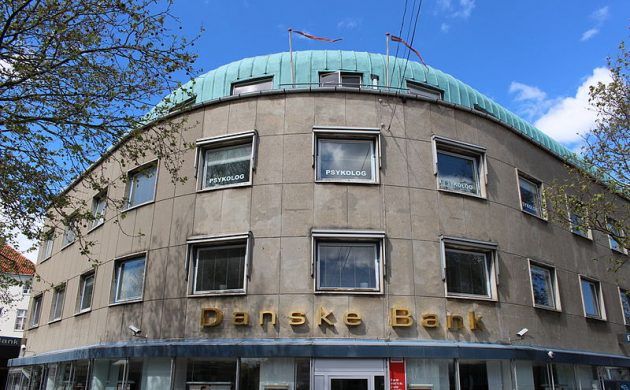Danske Bank has become one of the first major banks in the world to announce that it will dispose of the majority of its shares in oil companies that actively seek new oil sources.
The shares are worth “several billion”, Danske Bank confirmed to DR.
“We are tightening the requirements for companies that expand fossil production. As a consequence, we will sell a lot of companies from our portfolio,” said Mads Steinmüller, head of climate and nature at Danske Bank.
He does not yet want to name the companies that the bank will drop in the coming time, but the change will almost certainly impact its investments in the four oil giants Shell, Equinor, Totalenergies and Chevron, according to the organization Mellemfolkeligt Samvirke, which has reviewed the bank’s investments.
“This is fantastic news,” said general secretary of Mellemfolkeligt Samvirke Tim Whyte.
Danske Bank’s oil shares
Details
- Equinor
Value of shares: 1,613 million. - Shell
Value of shares: DKK 609 million. - Totalenergies
Value of shares: DKK 472 million. - Chevron
Value of shares: DKK 559 million.
Source: Statement of investments as of July 2022 from Mellemfolkeligt Samvirke.
Danske Bank has large stakes in the four oil giants, all of whom continue to expand their extraction of oil and gas in violation of recommendations from, among others, the UN and the International Energy Agency.
“Banks – and the financial sector as a whole – are investing billions in building new oil and gas fields, which will lock us into a dark future 20-30 years from now. And that is why we have been saying for several years now that they will have to stop investing in this expansion. And that is what Danske Bank is now listening to,” said Whyte.
In total, Danske Bank’s new policy could lead to a sell-off of over five billion kroner, according to the organisation’s calculations.
In the customers’ best interests
Last year, it was revealed that Danske Bank had invested over eight billion kroner in fossil companies that continue to search for new oil, coal and gas.
According to international recommendations, the only chance of limiting global warming to 1.5 degrees – a limit widely recommended by environmental scientists so as to avoid the worst consequences of climate change such as drought, floods and rising sea levels – is for the oil companies to stop the search for new oil sources.
“Companies that continue to expand their production pose a financial risk. The new policy is for the sake of the customer,” explained Steinmüller.
When pressed on whether Dansk Bank can guarantee that its customers will not lose part of their return when the shares are sold, Steinmüller responded: “in any case, we believe that this is in the best interest of the customers.”
Danske Bank will transfer the money to energy companies that are in the process of a green transition and which are on track to achieve their Paris Agreement targets.
When Danske Bank was criticized for its fossil fuel investments last year, the bank defended itself by saying that it was trying to push oil companies in a greener direction.
“After all, we also develop in step with society,” said Steinmüller. “At COP28, it was agreed that countries worldwide must phase out fossil fuels. And of course that means us as well.”
Danske Bank’s new policy
Details
- Danske Bank and Danica Pension’s new policy excludes shares in companies that are looking for new fossil fuels such as oil, coal and gas.
- There are some exceptions, including a “trivial limit”.
- Companies that are assessed to be on track to achieving their Paris Agreement goals are also excepted. These companies are defined as having “a four-star status with the Transition Pathway Initiative Scheme”.
- Today, only BP and Eni of the world’s major energy companies have that status. Chevron, Shell, Totalenergies, RWE and Equinor do not have status as on track towards the Paris Agreement.
- According to Danske Bank, their policy will lead to the sale of the “majority” of their shares in companies that expand fossil production.
Professor in Business in Society at CBS Andreas Rasche called Dansk Bank’s new investment policy “one of the most climate-ambitious” among the world’s major banks.
“Danske Bank is one of the first large banks in the world to take this step and move away from investing in fossil companies that expand production,” said Rasche.
Danske Bank’s policy has certain exceptions: such as if only a very small part of a company’s activity relates to the search for new oil, gas and coal.
But Rasche does not believe this detracts from the gravity of Danske Bank’s decision.
“I think it is good that Danske Bank is developing its policy. Fossil fuels are a dead end, and more and more banks are beginning to realize this,” he said.
According to Mellemfolkeligt Samvirke, Danske Bank’s move could actually mean that the bank is the first of the world’s 60 largest banks to choose to walk away from shares in these companies.
“It will create waves throughout the financial sector. Other banks no longer have any excuse to say it can’t be done. Other pension companies cannot say that it is impossible. Because now we see that one of the biggest giants in the global financial sector is taking this step,” said Whyte.













